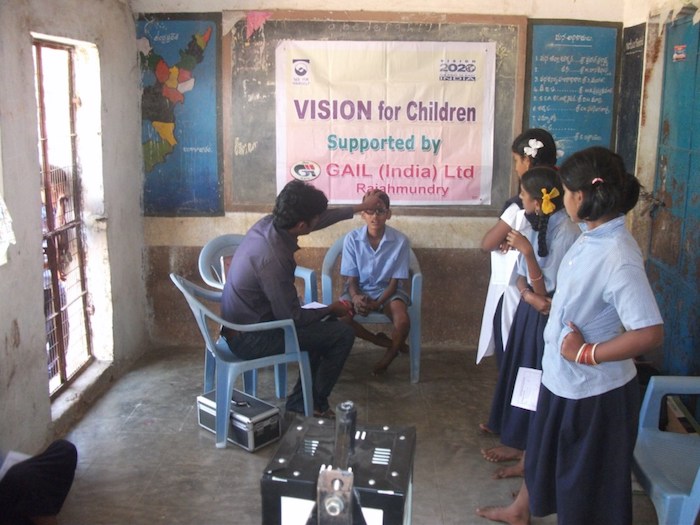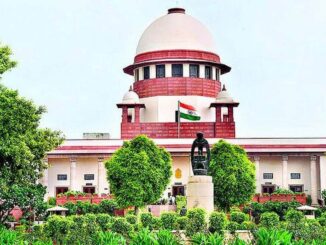
By Prakash M Swamy in Rajahmundry
Siva, a technician working at Goutami Eye Institute checks the eyes of the newborns at the neonatal intensive care unit in Government General Hospital in Kakinada, some 60 kilometers from Rajahmundry in the state of Andhra Pradesh.
He gently and carefully captures image of each eye of the prematurely-born babies with the help of portable Retinopathy of Prematurity (ROP) Retcam machine to check the blood vessels.
Dr. Y. Srinivasulu Reddy, an internationally acknowledged vitreo-retina surgeon at the Institute in Rajahmundry is waiting for the beep sound of his Whats App messages and on hearing the melodious tone; he enlarges the photos on the screen and checks minutely the images of the eyes, one after the other.
He enlarges the images of the doubtful eyes sent on his laptop screen and then calls Krishna and identifies the infants that require laser correction or other forms of intervention to save their precious sight. The images taken by Siva are instantaneously transmitted from the field to one of India’s acknowledged retinal surgeons Dr Reddy in real time so that no time is lost. Welcome to digital India.

Goutami Eye Institute, founded by the visionary Dr VK Raju Regional Eye Associates/ Clinical Professor, Department of Ophthalmology; West Virginia University and Founder, President; The Eye Foundation of America, is a shining example how tele- Ophthalmology helps save the nearly lost eyesight of thousands of new born babies in India.
The retina surgeon and his team await the arrival of the infants with weak blood vessels at the hospital and perform the necessary laser correction to restore the eye sight – all free of cost. The 50-bed eye institute that imparts world class treatment at no cost to the hapless poor has been hailed as a lamp that lights the houses of the underprivileged and saves them from darkness.
The pre-mature babies checked are below 35 weeks and weighing less than two kilos and the new born in premature delivery are prone to weak blood vessels as they are formed towards the end of pregnancy and are hard to detect.
The ROP Ret cam brought to India first time by Dr Raju costing close to Rs one crore provides an invaluable tool to detect retinopathy in premature babies whose parents have neither resources nor adequate knowledge to understand the seriousness of the problem leading to permanent blindness if not treated early.
The technicians visit all the neo natal intensive care units of government general hospitals in East and West Godavari districts and carry out the screening with the help of the Ret cam. Plans are on to expand the screening in Srikakulam, Vijayanagaram and Visakhapatnam districts in the future.

 The trained technicians are sent to neo natal intensive care units to take retinal images of the pre-mature babies and identify those at risk. Laser surgeries are performed free of cost to the poor and those who can afford pay a very nominal amount of Rs 2,000. Of the 1500 premature babies screened, 112 required laser surgery or other interventions to prevent childhood blindness, said V S Prakash, Chief Administrative Officer of the Institute.
The trained technicians are sent to neo natal intensive care units to take retinal images of the pre-mature babies and identify those at risk. Laser surgeries are performed free of cost to the poor and those who can afford pay a very nominal amount of Rs 2,000. Of the 1500 premature babies screened, 112 required laser surgery or other interventions to prevent childhood blindness, said V S Prakash, Chief Administrative Officer of the Institute.
The Institute is world class in the real sense as its one of the few centers in India to offer treatment to a disease where the eyeballs of the children keeps rolling or revolving. This results in the impairment of the vision permanently. Also known as Nystagmus or involuntary movement of eyeballs, the disease affects the new born. There are only 30 or so ophthalmic surgeons all over the world to correct the malfunctioning of the eyes with just a few in India, said VV Kumar, Secretary and Chief Operating Officer of the Institute.

The Institute has invited Dr. Richard Hertle of Akron Children’s Hospital in the US and one of the celebrated surgeons in the field to perform surgeries on the infants in Rajahmundry. Dr. Hertle is a regular visiting faculty for the last 5 years. He will not only perform the specialized corrective eye surgery free of cost between December 4 and 9 this year but will provide hands on experience to young Indian pediatric ophthalmic surgeons.
About two dozen young surgeons from across the nation will be invited to join the American specialist who will take them two per surgery he is doing on the infant by turns. The rest of them will interact with Dr Hertle in theater through video conference during all the surgeries. Using a sterilized microphone, he will clarify doubts and explains the procedure for correction while simultaneously performing the surgeries – all thanks to the vision of Dr Raju to make blindness free India.
The entire surgical corrections will be videotaped in high definition and shown to medical students. Dr. Hertle is expected to perform 150 to 200 surgeries during his stay in Rajahmundry. This will be first of its kind in India.
Dr. Leela Raju, world renowned cornea specialist, Leela Raju, chief of ophthalmology, Bellevue hospital, NY university Langone, New York and daughter of Dr Raju accompanied by Dr. Will Young and Dr Duncan Katherine also from the US, will be conducting free oculoplasty surgery on poor babies with corneal problems.
The team will be in Rajahmundry between December 4 and 7. The experts will operate on kids with unique disorders whereby the eyelids close involuntarily. These kids require a specialized surgery – a kind of plastic surgery- to correct the defects.
 The Institute that focuses on preventable blindness among children will be doing massive eye screening camps in all government and municipal schools. Over 5 lakhs screened, and many thousands of children provided spectacles in the project supported by Government of India’s Oil and Natural Gas Commission (ONGC) and Gail India Limited till 2013.
The Institute that focuses on preventable blindness among children will be doing massive eye screening camps in all government and municipal schools. Over 5 lakhs screened, and many thousands of children provided spectacles in the project supported by Government of India’s Oil and Natural Gas Commission (ONGC) and Gail India Limited till 2013.
The Institute has trained the primary school teachers how to check the vision of the children who have difficulty in reading from the black board (astigmatism) or those suffering from chronic head ache and refer them to the Institute for correction of refractive errors. The Institute has plans to revive the screening in East and West Godavari districts.
The Institute founded by Dr Raju in 2005 is working on 75 percent free treatment to be compensated partially by 25 percent of paying patients. On an average over 200 patients are seen every day and thousands are seen every year in outreach programs. in the outpatient department. Of which 25 to 30 patients undergo surgeries such as cataract, retinal surgery, pedantic cataract, squint correction for babies and adults. There are five full-time surgeons assisted by 75 para medical and other staff.
The Institute conducts rural eye camps in villages, identifies those require correction, brings them to the Institute for surgery. The patients are not only operated free but their three-day inpatient stay, food and medicines for three months are provided at no cost. One attender of the patients is also provided free stay and food.
For each patient fitted with Intraocular Lens (IOL) the government gives Rs 1000 as against the expenses of Rs 4,000 and the balance is absorbed by the Institute. The same cataract surgery is performed at a cost of Rs 6,000 in private hospitals.
The Institute also screens the current and retired employees of the State Government at every city and villages in Krishna, Guntur, East and West Godavari and Visakhapatnam districts under the state health insurance scheme. For each patient fitted with Intraocular lens (IOL), the government gives Rs 1000 as against the expenses of Rs 4,000 and the balance is absorbed by the Institute. The same cataract surgery is performed at a cost of Rs 6000 in private hospitals.
Termed as baby of Dr Raju, the Institute has gained from his expertise and international connection immensely. Visiting at least four to five times a year, he never carries any personal items as baggage but two suitcases full of medicines from the US for free distribution among poor patients. Such expensive medicines are never sold. The Eye Foundation of America started in 1979 is now working in 25 countries including India with the goal World without childhood blindness.





Be the first to comment